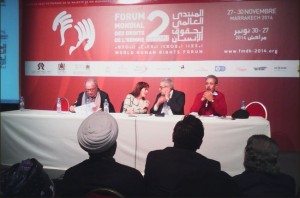By Hassan Benmehdi in Marrakech
for Magharebia
Participants at the World Human Rights Forum in Marrakech from November 27th-November 30th call for co-operation for Maghreb integration.
Maghreb campaigners in Marrakech call for regional integration through human rights.
Activists who converged on Marrakech last week for the World Human Rights Forum had a lot to say about Maghreb integration.
Their answers said a lot about the importance of human rights in the process of Maghreb integration.
Human rights are a platform for development in the Maghreb, said Arous Zoubir, an Algerian sociologist and founding member of the Forum Maghrebin.
“Through them, it is possible to build a unified Maghreb society against a backdrop of diversity and respect for others, which are necessary elements for integration,” he added.
Human rights may prove to be tools that transcend borders, leading to regional integration, not just in the Maghreb, but across Africa too, he explained.
According to lawyer and Mauritanian Human Rights Association member Mohamed Ahmed El Haj Sidi, those who speak up for civil liberties could create NGOs to bring people together and establish a common Maghreb platform capable of harmonising legislation on education, employment, international co-operation and respect for the values of human rights.
“Maghreb integration is possible through human rights and it is not a viable option to remain hostage to political decision-makers, who remain unable to breathe new life into the AMU,” he said.
But for Amina Bouayyach of the Moroccan Human Rights Organisation (OMDH), this issue remains complex due to the political ambitions of the different countries of the Maghreb.
In her view, each country in the Maghreb faces its own challenges: Between struggles with democratisation and complete chaos in terms of institutions, “it’s difficult for Maghreb NGOs to work towards co-operation.”
But young Tunisian charity worker Hala Essawab stressed the importance of the involvement of civil society in human rights to generate greater co-ordination across the work going on in each Maghreb country to protect civil liberties.
This inter-Maghreb human rights network should be armed “with the tools and resources needed to become a real creative force, driving political decision-makers towards Maghreb integration”, she explained.
Samir Maârouf, another young Tunisian who views the inter-American model as a textbook example for integration, agreed with Essawab.
“This is a model that brings together all the Latin American Human Rights NGOs to discuss and exchange views about all political, religious and legal issues, the main aim being to set out a way forward to find joint solutions,” he said.
It is not just the people of the Maghreb who want a united, open Maghreb, but all those both north and south of the Mediterranean who aspire to a shared area of prosperity and peace, Hammouda Tarik of the Justice and Truth Forum told Magharebia.
He called for a joint examination of human rights review strategies in the region.
“Amongst other things, Maghreb integration requires greater co-ordination between Human Rights NGOs in the Maghreb,” he said.
Overall, most speakers called for greater collaboration between Maghreb NGOs.
“We share the same concerns and the same challenges, hence the urgent need to look again at ways to achieve a joint strategy across the Maghreb to encourage a culture of Human Rights in the region,” they said.








